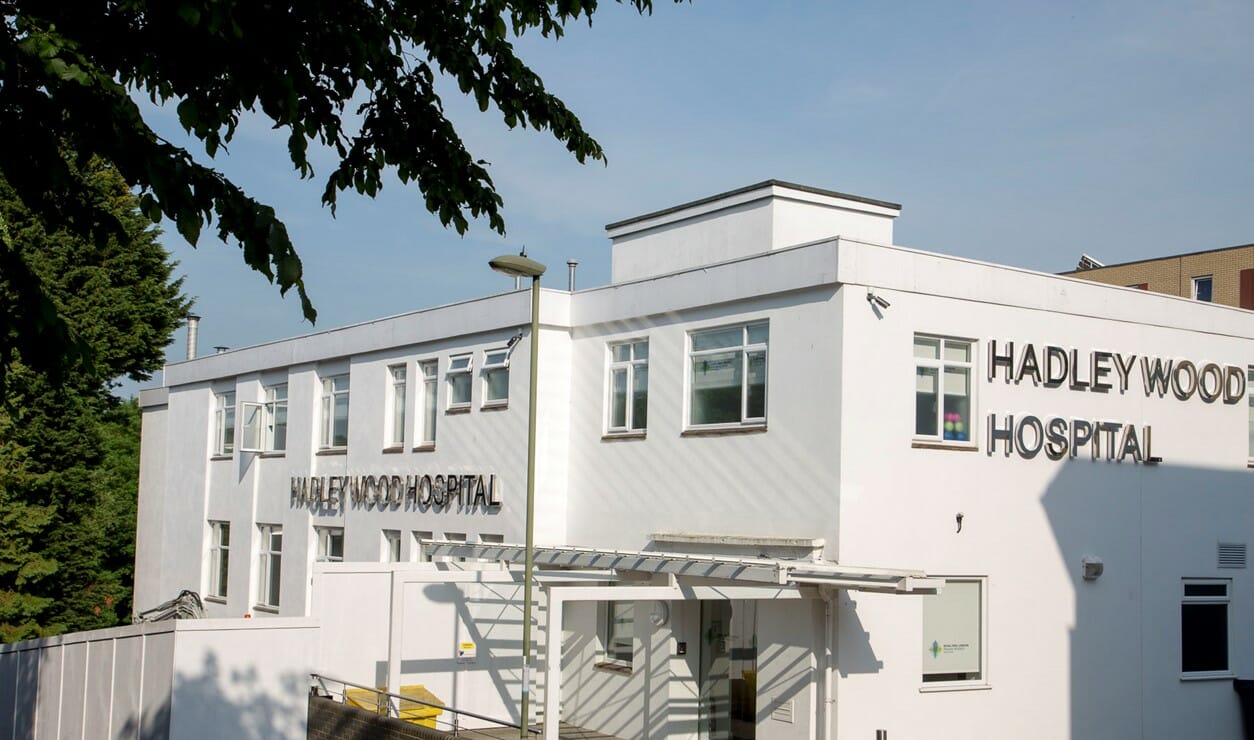Colposcopy
Our Colposcopy treatment is provided at our Hadley Wood Hospital, High Barnet.
Private colposcopy
The private colposcopy clinic is open on Tuesdays and Thursdays between 12:00 and 2:00pm (other times are upon request, please call us at 020 7317 7751, and our Enquiries team will be happy to assist you and check if your request can be accommodated).
Our private colposcopy service offers diagnostic colposcopy clinics, outpatient treatment clinics and cytology clinics.
This is for women who have abnormal smears or concerning symptoms like bleeding after sex or bleeding in between periods. We can offer the full range of service including diagnosis and treatment of cervical abnormalities.
Inpatient treatment including laser is offered to those who are unsuitable for outpatient treatment.
The Royal Free London NHS Foundation Trust has a national reputation for its contribution to translational research within the NHS cervical screening programme over the past 20 years.
All our private gynaecologists are NHS consultants at the Royal Free, Barnet and Chase Farm Hospitals. We are proud to bring the very best skills and standards of the NHS to benefit our private patients and, in doing so, support the continued development of the NHS and the Royal Free London through our success.
Learn more about our private gynaecologists team by visiting our consultants page.
What is a colposcopy?
A colposcopy is an examination to check whether there are abnormal cells on your cervix (neck of the womb), and if so, how serious they are. These changes are caused by certain types of human papillomavirus (HPV) infection. A colposcopy usually takes place in an out-patient hospital clinic.
It is also advised in women with postcoital bleeding or where the GP or practice nurse is concerned about the appearance of the cervix.
Why do I need a colposcopy?
You may have got a letter from the national screening service as a result of a smear test advising colposcopy or the GP may recommend it based on your symptoms or the appearance of your cervix. This procedure determines the cause of the abnormalities and lets the colposcopist decide if you need treatment.
Abnormal cells are not unusual – about one in 12 smears is abnormal and it usually means small changes have been found in cells on the cervix. These changes are known as dyskaryosis and act as early warning signals that cervical cancer might develop in the future.
It is very rare for these abnormalities to be cancer. For some women the changes in the cervix return to normal by themselves, other women need simple out-patient treatment. There is a 95% chance that the abnormality will be cleared. However, there is a small possibility that it might persist at a lower grade (with borderline or mild cell changes). Treatment does not guarantee that you will no longer have an HPV infection.
Contact us Monday to Friday, 8am - 6pm:
Booking line: +44 (0) 20 4527 2993
How is a colposcopy done?
The colposcopist will take a close look at your cervix using a magnifying lens with a light (a colposcope). They may take a small tissue sample (a biopsy) to check any areas of your cervix which look unusual. If the colposcopy confirms there are abnormal cells on your cervix, you may need to have to have them removed to help prevent cervical cancer.
Preparation for colposcopy
If you think you might have your period on the day of your appointment, you should call the clinic to arrange a different time.
To make it easier to look at your cervix during your colposcopy, please do not have sex or use vaginal medications, lubricants, or creams for at least 24 hours beforehand.
You should bring a panty liner to your appointment as you may have a small amount of vaginal discharge after your colposcopy. If you have a small tissue sample taken (a biopsy), you may also experience some light bleeding.
What happens during a colposcopy?
You will need to undress from your waist down and lie down on a bed with your knees bent. You will be asked to place your legs onto some padded supports. You will have a paper sheet or towel to cover your stomach and hips. The examination takes about 10 to 15 minutes.
Just like at your screening test, the colposcopist will put a speculum (a smooth, tube-shaped tool) into your vagina and open it gently. They will then use a colposcope to take a close look at your cervix. The colposcope does not go inside you, or even touch your skin. It stays about 30cm (12 inches) outside your vagina. The image of the cervix from the colposcope will sometimes be on a screen. This helps the nurse or doctor see your cervix more clearly.
They will dab different liquids onto your cervix with a cotton bud or small sponge. The liquids make any abnormal cells a different colour so that they can be seen more easily. If the colposcopist finds anything unusual they may take away a small tissue sample (a biopsy). The biopsy will then be checked in the laboratory.
The examination can feel uncomfortable and rarely, some people may feel some pain. If it feels painful, tell the nurse or doctor and they will try to make it more comfortable for you.
The nurse or doctor may be able to tell you what they have found straight away. If you have had a biopsy taken, it will need to be checked in the laboratory. If this happens, you will get your results usually within 5 working days.
After colposcopy
Most people feel well enough to go about their day-to-day activities straight away, but some may need to go home and rest for a while. You may have some brownish discharge from your vagina from the liquids that were used during your colposcopy.
For the next few days, you may have some light bleeding from your vagina, especially if you have had a biopsy. This is normal and usually stops after three to five days. It’s best to avoid sex, using tampons, and any vaginal medications, lubricants or creams until the bleeding stops to prevent any infection.
Funding your treatment
- Self-fund
- if you have private medical insurance
To find out more about these payment options, please contact our Enquiries team at 020 7317 7751 or email rf-tr.privateenquiries@nhs.net.
Meet our consultants
We work with leading experts who are all supported by the expertise of a multidisciplinary team. Our specialist team of doctors and surgeons includes:
Hadley Wood Hospital, High Barnet
Hadley Wood Hospital is a dynamic new private healthcare facility located in High Barnet, North London.
Part of the Royal Free London NHS Foundation Trust, Hadley Wood Hospital offers you access to some of London’s most experience specialists, all of whom work as NHS consultants at the Royal Free, Barnet and Chase Farm Hospitals.

Our profits are reinvested into the NHS which supplies essential equipment, funds medical research and supports patient care.
If you’d like to know more about our specialties and treatments, please get in contact with us.

